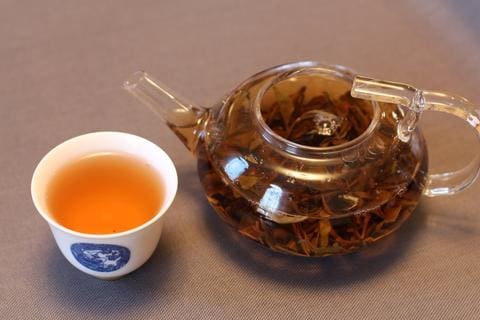
These Three Benefits of Black Tea Make it the Perfect Winter Life Hack
We tend to associate green and white teas with the spring and summer seasons and oolong and black teas with the fall and winter seasons. There could be any number of reasons for this.

For instance, most of the lighter teas are harvested in the early spring while the darker ones tend to be harvested or complete in the fall. So maybe it’s just availability? But it seems to be more than this.
We often find that we feel like having darker teas as the weather gets cooler and evening settles in quicker while we feel like having lighter teas when it is warmer and the days longer. The same is true of our selection of foods, preferring heavier foods in the winter and lighter ones in the summer. Is this habit?
There may be more to it than psychology and availability of goods. As it turns out, more and more research is showing that black tea has some health benefits that seem especially suited for the colder months.
- Stress – A study done by University College London and published in Psychopharmacology showed that people who drank tea were able to recover from stress much faster than those who drank a fake tea substitute. After the participants were placed in a stressful situation—verified by blood pressure readings and cortisol levels—the tea drinkers saw a 50% improvement in their stress markers over the group who had the fake tea.
The tea used in the study? Black tea!
So when you’re starting to experience the stressful effects from holiday shopping, event planning, family get-togethers, and New Year’s parties, be sure to cozy up with a cup of black tea to wind down!
- Diabetes – Diabetes is a frustrating and serious disease that can have a significant impact on one’s quality of life. When it comes to the development of Type 2 Diabetes, however, doctors believe that a healthy and active lifestyle can help prevent it. As it turns out, black tea might help complement that lifestyle.
Researchers published an article in the British Journal of Medicine after reviewing black tea consumption in over 50 countries from 2009, contrasting it with health data available from the World Health Organization. Multiple statistical analyses uncovered a consistent correlation between consumption of black tea and occurrence of diabetes.
The analyses showed that those populations who consumed more black tea experienced fewer cases of diabetes, a conclusion supported by other forms of research as well. So while it would be ideal to avoid those rich desserts and sweets in the winter altogether, if you find yourself giving into temptation, you may want to think about pairing it with a cup of black tea (and a brisk walk) to play it safe.
- Influenza – Anyone who has had the flu knows how miserable it can make you feel, and unfortunately, experts from the Mayo Clinic and the CDC are predicting that the 2017–2018 season may be one of the worst yet. The best flu prevention tips are pretty well-established: vaccines, good hygiene, and keeping away from others if you happen to find yourself sick. But if you really want to add an extra layer of protection, you may just want to drink some more black tea.
A study from researchers at Harvard Medical School found that the chemicals from five cups of black tea helped boost the immune system. When blood samples were taken from human volunteers, the immune system cells from the tea drinkers responded five times faster than those from the coffee drinkers. More recent research from the Chinese Academy of Medical Sciences pinpointed the theaflavins in black tea as especially suited to help combat the flu, both revving up the immune system while also demonstrating antiviral activity.
Hopefully you won’t get sick at all this season, but it sounds like black tea might both help with prevention and recovery.
Happy Holidays!
1 - University College London. "Black Tea Soothes Away Stress." ScienceDaily. ScienceDaily, 4 October 2006. <http://www.sciencedaily.com/releases/2006/10/061004173749.htm>.
2 - BMJ-British Medical Journal. "Low prevalence of type 2 diabetes among regular black tea drinkers." ScienceDaily. ScienceDaily, 7 November 2012. <http://www.sciencedaily.com/releases/2012/11/121107200148.htm>.
3 - “America faces one of the worst flu seasons ever.” 6 December 2017. <http://www.dailymail.co.uk/health/article-5148911/This-years-flu-set-one-worst-ever.html>
Antiviral Res. 94(3):217-24. “In vitro anti-influenza virus and anti-inflammatory activities of theaflavin derivatives.” Zu M, Yang F, Zhou W, Liu A, Du G, Zheng L. 2012 June. <https://www.ncbi.nlm.nih.gov/pubmed/22521753>
Proceedings from the National Academy of Sciences USA. 100(10): 6009-6014. “Antigens in tea-beverage prime human Vγ2Vδ2 T cells in vitro and in vivo for memory and nonmemory antibacterial cytokine responses.” Arati B. Kamath, Lisheng Wang, Hiranmoy Das, Lin Li, Vernon N. Reinhold, and Jack F. Bukowski. 2003 May 13. <https://www.ncbi.nlm.nih.gov/pmc/articles/PMC156317/>

MeiMei Fine Teas on
Thanks for your note! Glad to hear this article was beneficial for you Lizzy. The health benefits of tea are many and varied, so is really a topic worthy of exploration. Best of luck in handling your diabetes. Don’t forget to check our some of our great black teas as well! :-)
Lizzy White on
Very nice and well explained article. It is true that tea is not only a beverage, but is loaded with a lot of health benefits. Previously I was not so much into tea, but slowing I started having a cup each day and now it is my favourite! I got my first tea from Halmari as I had a lot about them and since then I have become a tea lover. I have diabetes, so these winter hacks with black tea will really be helpful for me. Thanks! :)